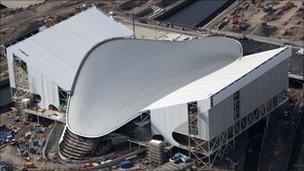Rowecord Engineering, Newport: 430 jobs lost, say administrators
- Published
Rowecord workers say they are shocked by the company's collapse
Some 430 people will lose their jobs after the collapse of Wales' biggest steel contractor, administrators have confirmed.
About 80 people will be kept on at Newport-based Rowecord Engineering, which built the roof of the Olympic aquatic centre.
The company said it had "exhausted every option" to try to carry on.
There are fears other companies along the M4 corridor which supplied Rowecord could also be affected.
Alistair Wardell, from administrators Grant Thornton, blamed the collapse on the company losing money on contracts and the general economic climate, which had led to future contracts drying up.
A contract to build the new blast furnace at Tata's Port Talbot steelworks had overrun by more than three months which had caused difficulties, he said.
Mr Wardell told BBC Radio Wales the issue had led to a dispute with Tata but he could not say for certain whether the business would have survived otherwise.
"I think certainly, in the short term, that amount of cash that was not available to it has partially precipitated the collapse of the business," he said.
"We are taking about a large amount of money.
"What I can't comment on is... ultimately whether this was a viable business or not. That is a very separate question."
In an earlier statement, Mr Wardell said the collapse of the company was also likely to have an impact on other firms along the M4 corridor which were its suppliers.
Vital partner
A spokesman for Tata Steel said the company had settled the issue about the overrunning of work on the blast furnace a month ago.
He described Rowecord Engineering as a vital partner.

The London 2012 Aquatics centre roof is one of the company's recent high-profile projects
"We have met all our commercial obligations," he said.
"We have offered them future work. It will cost us to replace them."
Earlier it was revealed that Rowecord turned down an offer of help from the Welsh government before it collapsed.
The Olympics aquatic centre roof was among its many high profile projects.
The Welsh government said it offered assistance to the maximum level allowable within state aid rules but Rowecord turned down the offer.
Until recently the company employed over 500 staff at sites in Newport, Baglan, and the Tata Steelworks at Port Talbot - but 100 of those were given notice over recent months.
In a statement on Friday the company said it had "exhausted every option to sustain the business in future" and would go into administration.
Tory business spokesman Nick Ramsay said he accepts that help was offered but told BBC Radio Wales it came too late in the day.
"You've got to face the fact there are these drop-offs in ordering linked to the recession," he said.
"Although the Welsh government did offer support I think that was later in the day than it might have been.
"I think what we really need to see from the Welsh government is a better manufacturing strategy, for the government to stand back and say 'right, how are we going to better support companies like this?'
Rowecord has been a steelwork contractor on major projects, including:
Parc y Scarlets rugby ground
Cardiff City Stadium
Glamorgan County Cricket pavilion
The BBC Porth Teigr studios in Cardiff Bay
Blast furnace 5 at Port Talbot steelworks
Ron Jones, a Labour councillor in Newport's Pill ward, which covers Rowecord, described the news as a "major blow".
He added: "It's devastating to us actually because as an area of high unemployment, in excess of 20%, and this is adding to all that misery.
"They have been here since 1970. They are a major company in Newport and when a major company goes to the wall you're in deep trouble."
- Published27 April 2013
- Published26 April 2013
- Published26 July 2011